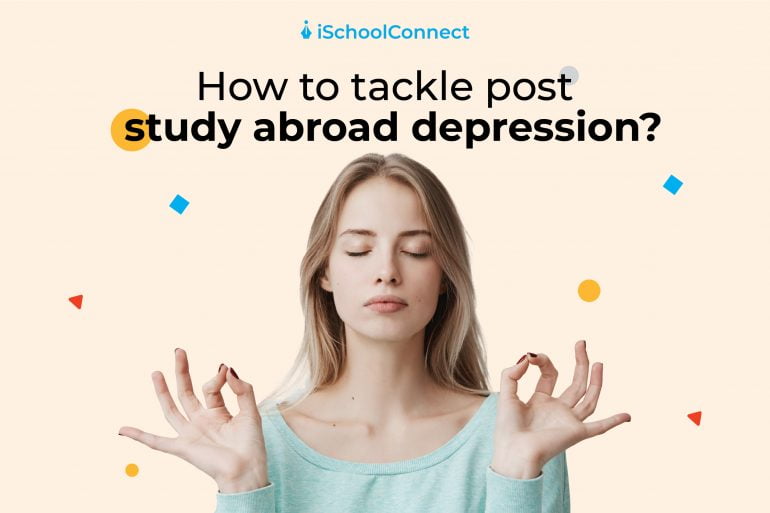Table of Contents
Post-study abroad depression (PSAD) is an array of emotions students experience after completing their educational journey overseas. Many students returning home often report feelings of culture shock, depression, anxiety, and loneliness after living abroad.
Going back to a former lifestyle after you have experienced a different one while living overseas can be a challenge. Keep reading to discover six helpful tips designed to cope with PSAD better!
6 tips to cope with post-study abroad depression
Follow the below tips to better cope with your post-study abroad depression
#1. Recognize the symptoms

It is normal to feel occasional pangs when thinking of your host country. However, post-study abroad depression can get serious, and the symptoms are as follows –
- Withdrawing from friends and family in your home country.
- Feelings of isolation or thoughts such as “no one understands me.”
- Spending more time than necessary looking for opportunities to live in your host country.
- Difficulty in concentrating or catering to responsibilities.
- Excessive sleeping or getting not enough sleep.
- Unnecessary comparisons of home culture with the host culture.
- Constantly criticizing different aspects of your home culture.
If you recognize at least three or more of the above signs, it can indicate that you need to work on coping with your thoughts and emotions. In extreme cases, professional help for post-study abroad depression is advisable.
#2. Understand & accept your experience
One of the first steps to coping with post-study abroad depression is recognizing that what you are going through is normal. While acceptance of your thoughts and feelings can be challenging, it is the first step to successfully working through PSAD. It is important to recognize that all of your experiences are varied. As a result, adjusting your expectations can be helpful.
Take some time out to reflect on your experiences overseas, recognizing that you made the most of your time away from home. Journaling can be a great way to help you realize how much you have grown through the course of your studies abroad.
#3. Sharpen your skills
While you may have developed a wide range of skills during your time overseas, returning home is a great opportunity to refine your learning. Look for conversation circles, student clubs, or cultural centers in your city where you can demonstrate your hold of a new language or trait and share your experiences. Not only will this curb your host sickness, but it will also help keep your knowledge sharp. You can also consider enrolling in online courses that help you upskill yourself. The added exposure from studying abroad will give you all-rounded knowledge and expertise.
#4. Take up a cause
Studying abroad can be an excellent eye-opener for the social causes you can be involved in back home. Channel your knowledge, skills, and expertise towards contributing to societal causes in your free time. This rewarding diversion is one of the best ways to deal with symptoms of post-study abroad depression. Do some research on the nearest local non-profit organizations in your area where you can volunteer. This will not only help you keep your mind off uneasy thoughts but also help you use your time productively.
#5. Talk about your experiences with a trusted companion
Sharing what you feel is one of the best ways to work through your thoughts and feelings. Post-study abroad depression can be exhausting to deal with regularly so consider confiding in a close friend or family member.
Because of the cultural difference between the host country and home country, several students experience symptoms of post-study abroad depression. Therefore, some different online forums and groups can help you get in touch with others who have experienced the same. Interacting with people across different cultures can help give you a new perspective on your situation, helping you adjust your thought processes accordingly.
#6. Consider the next step of your academic career

A great way to beat the post-study abroad blues is to be prepared for the next step. The world is, literally, your oyster! If your travel-abroad documentation is authorized and organized, it becomes significantly easier to continue your academic journey overseas at a later stage. If going abroad for the next step of your academic journey is something you are open to, you can begin researching and planning in your spare time.
It is also important to note that you are not limited to the specific country you completed your previous qualification. Consider expanding your horizons and studying in a new country at a reputed university. Several online resources and organizations help you transition to living in a new country smoothly and efficiently.
Key takeaways
- Post-study abroad depression or PSAD is a series of thoughts and emotions that are experienced by students returning home after completing their degree overseas.
- Dealing with PSAD can be challenging and frustrating. The ability to effectively work through emotions often varies from person to person.
- The aim of the blog was to equip you with all the relevant information you need to create a successful coping strategy for yourself.
- Remember to do what feels right for you. Paying attention to your thoughts and emotions is one of the best ways to understand and cope effectively with them.
Was this blog an engaging read? If yes, be sure to share your thoughts in the comments below!
Click here to reach out to us for more information on this topic. We would be happy to guide you!
Liked this blog? Read more: 6 ways students can deal with depression and anxiety.
FAQs
Q1. Can I consider volunteering opportunities abroad if I am not interested in studying further?
Answer – Absolutely! Several organizations seek candidates who are motivated volunteers and can contribute to their initiatives. Do your research carefully to find an organization in a country that is in alignment with your interests and your goals.
Q2. Is blogging a good way to cope with PSAD?
Answer – Definitely! Sharing your experiences with an audience through informative blogs can be a great way to create your online community for support and guidance. You will also provide a great deal of information to individuals who are new to the symptoms of PSAD.
Q3. Do universities abroad provide resources to deal with PSAD?
Answer – PSAD is a phenomenon that affects thousands of students studying abroad. Therefore, several universities have dedicated forums, pages, and support groups to help students cope better. More information on these resources will be available on the official website of the said university.






